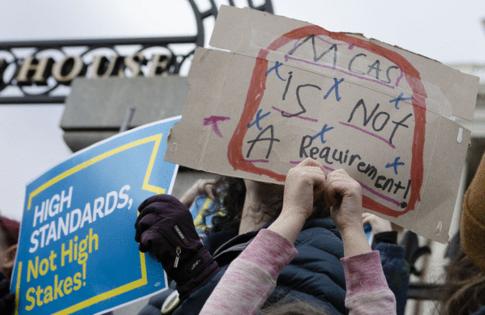Pols & Politics: Massachusetts' most expensive ballot question fight of the 2024 election
Published in News & Features
A fight between a teacher’s union and business groups over the fate of the MCAS was the most expensive ballot question battle in Massachusetts during the 2024 election cycle, according to the most recent accounting, with nearly $20 million spent between the two sides since the start of the year.
The staggering amount, last updated in state records on Nov. 5, either dollars spent outright by the two ballot question committees or logged as in-kind contributions for goods or services, underscores the weight of the measure, which sought to get rid of the MCAS as a graduation requirement for high school students.
The Committee for High Standards Not High Stakes successfully convinced voters to end the use of the test as a graduation requirement and won with over 59% of the vote. The committee, largely backed by the Massachusetts Teachers Association, said it was “truly a collective victory.”
The group argued the test forced teachers to narrow their curriculum in an attempt to help students pass the standardized test. Supporters also said the MCAS hurt students with a learning disability.
“Change is never easy or swift. When it comes to our children’s education, we must be certain that we are acting in their best interests. But there are no better experts in what our children need to succeed academically than the educators working every day in the classrooms of our public schools,” the union said in a statement after Election Day.
The committee only spent $750,000 in 2024 but received over $14 million in in-kind contributions from the Massachusetts Teachers Association for everything from voter outreach to campaign signs and staff travel expenses to advertising buys, state data shows.
But opponents said eliminating the testing requirement without a replacement was reckless.
“The passage of Question 2 opens the door to greater inequity; our coalition intends to ensure that door does not stay open. Those responsible for our state’s public education system need to have an honest conversation about whether moving forward with this proposal is the right decision for Massachusetts,” the Protect Our Kids’ Future: Vote No on 2 coalition said.
The group spent nearly $5 million, including dollars logged as in-kind contributions, to oppose the question but fell short with only 40% of the vote, according to state data.
Should Massachusetts Democrats learn anything from the 2024 election?
The day after the election, when it was clear Donald Trump had successfully completed a sweep to return to the White House, Massachusetts House Speaker Ron Mariano urged the Democratic Party to view the results as a “wake-up call.”
He was one of many in Massachusetts who urged those on the left to refocus themselves on issues that drove people away from the party after Trump made gains in New England. He also said local lawmakers’ jobs will have “heightened importance” under a second Trump term.
Mariano’s remarks came after a longtime incumbent in the Massachusetts House lost to a Republican and an open seat that was last held by a Democrat was flipped by a conservative. Democrats also gained two seats, victories that meant the partisan breakdown in the chamber would not change.
The Quincy Democrat pointed out that “net-zero” result and appeared to critique the only incumbent House Democrat to lose, Rep. Pat Haddad of Somerset, when asked Wednesday if there were any lessons to be learned from the election.
“I don’t understand why we need a lesson from two lost seats. What is the catastrophe there that you see that I’m missing,” he said. “I think there’s introspection about the candidates. How hard did they work?”
It was a comment that immediately raised eyebrows because Haddad was caring for her ill husband, who died over the summer, during campaign season.
Mariano almost immediately walked back his remarks, saying in a follow-up statement that he was trying to refute the “suggestion that there was a statewide trend towards electing a greater number of Republicans to the House here in Massachusetts.”
He also said he considered Haddad, who he has served with since 2001, a “longtime friend.”
“Over the past few years, Rep. Haddad cared for her family throughout her husband’s illness, and after his passing this summer, limiting her ability to vigorously campaign in a competitive district. The House will be worse off without Rep. Haddad’s valuable, nuanced perspective on so many issues,” he said.
Walsh’s Postal Service bid withdrawn
On the heels of Kamala Harris’ election loss, former Boston Mayor Marty Walsh’s nomination to serve as a governor of the U.S. Postal Service was withdrawn from the Senate by President Joe Biden, the White House announced on Thursday.
Walsh’s name had been submitted for consideration to the U.S. Senate on Feb. 29 for a term expiring in 2029, a role that would have allowed the longtime union leader from Dorchester to keep his day job as head of the NHL Players’ Association.
The White House did not provide a reason for why Biden pulled the nomination for Walsh, who previously worked for his administration as secretary of labor before departing for what was reportedly a sizable pay hike at the NHL players’ union.
Biden ended his reelection bid amid public and political pressure after a poor debate performance that paved the way for Vice President Kamala Harris to secure the Democratic nomination. He will hand over the reins to President-elect Donald Trump, who he defeated in 2020, in January.
Walsh played a key role in vetting Harris’ potential running mates, and was floated as a possible chief of staff for her administration, according to a prior report by Politico.
_____
©2024 MediaNews Group, Inc. Visit at bostonherald.com. Distributed by Tribune Content Agency, LLC.







Comments